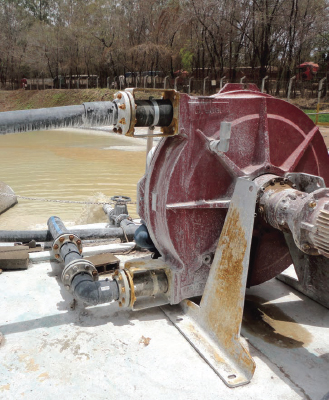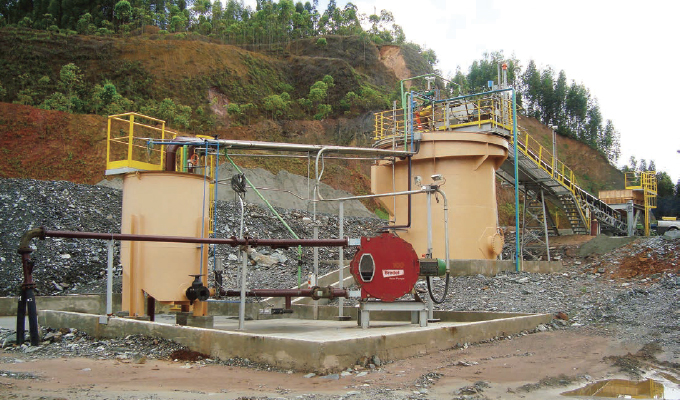In the first part of this article, we listed a number of primary advantages linked to the use of peristaltic hose pumps for high density, abrasive paste transfer at precious metal mines. In this month’s conclusion, we’ll see how Bredel hose pumps were installed in several mining operations and faced up to the heat and wear of harsh conditions, proving the variety of peristaltic hose pumps in the field.
Mining companies sustain losses up to $3,000 per hour for every equipment failure incident.

CASE STUDY #1: NIOBIUM EXTRACTION
Niobium (Nb) is a rare earth mineral with impressive anti-corrosive properties, making it very resistant to heat and wear. There are currently only three mines producing the majority of the world’s niobium: CBMM in Brazil, CMOC International in Brazil, and the Niobec mine in Canada.
Paste at the Ouvidor mine of CMOC International is made up of 44 percent niobium with water, sulphuric acid, isopropyl, and a flocculant. The solids content rises to 75 percent as the pulp becomes more concentrated at the bottom of the underflow thickener tank. Put simply, centrifugal pumps could not manage such a high concentration of solids. Sometimes piston pumps are deployed for high-density sludge, but the types that can withstand the abrasion levels are extremely expensive.
Bredel hose pumps were installed, using 75-millimeter diameter suction and discharge piping, to discharge the sludge from the tank and transfer it 985 feet to the filter press. The pumps are controlled manually and speed is reduced if pressure at the filter press increases. Following solids removal by filtration, the remaining wastewater is pumped to a lagoon or tailings dam. At this point there are still residues of aggressive chemicals in the water. Bredel pumps cope with not only the abrasive solids, but also the chemical content.
At Ouvidor, the centrifugal pumps suffered badly due to abrasive wear and chemical attack. The downtime to repair a pump was at least six to eight hours. In addition, the pumps had to be removed from beneath the thickener. In contrast, a Bredel hose and lubricant can be changed in less than four hours, and does not require a standby pump to be moved into place so both uptime and productivity levels can be increased.
Several Bredel hose pumps are in operation, all pumping niobium pulp in tank transfer duties, running eighteen to twenty-four hours per day with EPDM hose life five months.
The mine has installed several Bredel hose pumps, some of which have been providing reliable operation for nearly a decade. Many are pumping niobium pulp (44 percent), and although some were acquired for new applications, a number replaced existing centrifugal pumps.
A case in point is a Bredel 65, which replaced a centrifugal pump that required frequent maintenance. Seven years later, the Bredel is still performing strongly, pumping through a 9.8 feet high, 26 feet long discharge pipe at a flow rate of 1,850 gallons per hour. Also installed around the same time was a Bredel 50, which replaced a centrifugal pump with an open impeller that again was suffering due to attack from chemicals and abrasive wear. In this tank-transfer application, the niobium pulp is discharged through a 4m high, 5m long pipe at a flow rate of 1,188 gallons per hour.
Elsewhere at Ouvidor, Bredel pumps serve applications including dosing of coagulant, and reject suction and filter press feed. The latter application was performed by a vertical centrifugal pump which could not transfer the pulp in high concentration or cope with the pressure of the filter press. The replacement Bredel pump has successfully been in service for nine years, pumping the phosphate reject with fluosilicic acid at a flow rate of 7,395 gallons per hour and 7 bar pressure along a 1,050 feet long discharge pipe (9.8 feet high).
CASE STUDY #2: PLATINUM EXTRACTION
Allowing for losses which occur during refining, and the varying platinum content of the different ores found within the Bushveld Igneous Complex SA, between 11 and 44 tons of ore must be processed to obtain a single ounce of platinum. Concentration is the process of separating milled ore into two streams: one greatly enriched in the valuable mineral (concentrate) and another of waste material (tailings). This step is vital in terms of economics as it reduces the volume of material which must be transported to and processed in a smelter/refinery.
At the Waterval plant of Sibanye Platinum in South Africa, six Bredel 100 hose pumps are being deployed to transfer concentrated platinum paste with specific gravities of between 1.4 and 1.7. Four of the Bredel 100 pumps are transferring paste from thickener to storage tanks over a distance of 295 to 328 feet, while the other two are transferring it around 590 feet from a holding tank to a storage tank.

CASE STUDY #3: GOLD MINING
An interesting case study involves the Peñasquito gold mine in Mexico, which is operated by GoldCorp Group. The customer, Mex-Mex Peñoles, is the foundry that receives all of the concentrates from Peñoles group mines, which are then processed to separate the minerals.
The pump application centres on thickener underflow for acid leaching and hot acid leaching (used to extract minerals from the ore). Several Bredel hose pumps are deployed with some having been in use for over thirteen years. Such longevity is despite the use of aggressive chemicals, including cyanide, where leaching dissolves gold out of the ore using a chemical solvent as part of a process called carbon-in-pulp (CIP). Carbon particles are also used, primarily to attract the gold, while hot caustic is deployed to separate gold from the carbon. Further chemicals in use include lime for water treatment, and flocculant to consolidate solids and retrieve water.
In a thickener underflow application at the Queiroz mine of AngloGold Ashanti in Brazil, Bredel hose pumps have replaced centrifugal models due to extremely high maintenance costs and high water consumption. Two units (four pumps) serve two tanks handling gold paste at 70 percent solids content (30 percent H2SO4) with a viscosity of 2,150 mPa.s. Elsewhere at this plant, two smaller Bredel pumps transfer a cyanide and caustic soda mix in acid leaching applications.
One mine has cut the cost of spares by nearly 50 percent since the installation of their Bredel 100 hose pumps.
At a gold mine in Brazil, owned by Mineracoa Turmalina Ltd., a number of hose pumps are being used to handle substances such as ethanol, hydrochloric acid and paste containing 73 percent solids content (68 percent waste solids, 5 percent cement and water). In this instance, the paste discharge is via 1,640 feet horizontal piping, followed by a further 985 feet vertical pipe downwards. The distance from the tank to the final outlet means that a maximum discharge pressure of up to 12 bar is generated at the pump. Despite aggressive chemicals and back pressures up to 12 bar, the Bredel hose pumps in these gold extraction processes achieved hose life between three and five months, in eighteen-hour continuous duty.
CONCLUSION
Moving ores, concentrates and residues in slurry form are essential parts of industrial mining processes. However, mining operators must constantly seek ways to meet their social and environmental responsibilities.
In mines around the world Bredel heavy duty hose pumps have helped companies reduce water and chemical usage. This, combined with lower maintenance intervals and the need for fewer spare parts means Bredel hose pumps are helping mining operators meet their environmental obligations while saving costs.
FOR MORE INFORMATION
Siemens Digital Industries Software, a business unit of Siemens Digital Industries, is a leading global provider of software solutions to drive the digital transformation of industry, creating new opportunities for manufacturers to realize innovation. With headquarters in Plano, Texas, and over 140,000 customers worldwide, we work with companies of all sizes to transform the way ideas come to life, the way products are realized, and the way products and assets in operation are used and understood. For more information, visit www.sw.siemens.com.
Watson-Marlow Fluid Technology Group (WMFTG) is the world leader in niche peristaltic and sinusoidal pumps and associated fluid path technologies. Founded on nearly sixty years of supplying engineering and process expertise and with over one million pumps installed worldwide, our pumps are tried, tested, and proven to deliver. For more information, visit www.wmftg.com.
MODERN PUMPING TODAY, July 2019
Did you enjoy this article?
Subscribe to the FREE Digital Edition of Modern Pumping Today Magazine!



